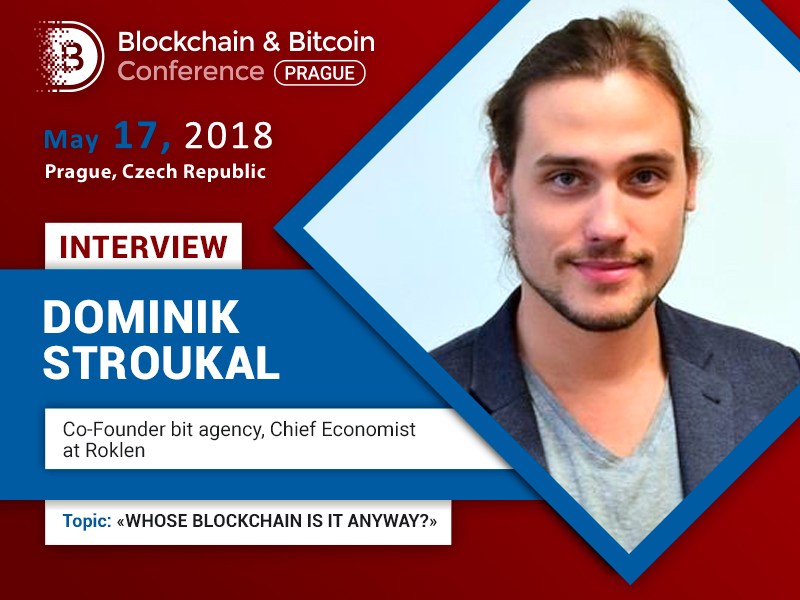
Bankers and government officials understand what cryptocurrencies are and would like to put them in existing categories, but they are neither money and goods nor anything else. This is what Dominik Stroukal, Chief Economist at Roklen and speaker at Blockchain & Bitcoin Conference Prague, thinks about digital assets. We talked to him about approaches of various countries to defining cryptocurrencies and tokens and discovered how the difference in terms could affect cryptocurrency businesses.
Interviewer: Blockchain & Bitcoin Conference Prague (BCP)
Speaker: Dominik Stroukal (D.S.)
BCP: How would you define cryptocurrencies?
D.S.: That is the hardest question of all. Linguistically, it should be “crypto” and “currencies”. Cryptography is what defines ownership, not a centralized authority. And currency, a relatively well-defined term in economics, is a circulating medium of exchange.
So for me a cryptocurrency is circulating medium of exchange with ownership defined exclusively by cryptography.
BCP: Why do authorities of various countries take different approaches to defining cryptocurrencies, and what legal status would be appropriate for them?
D.S.: Countries simply do not know what to do. When you talk to central bankers and state officials, you feel that they understand what cryptocurrencies are and would like to put them in today’s categories. Unfortunately, Bitcoin is clearly not a commodity, still is not money, neither it is anything else we currently know. The best definition so far is “something like money”.
So it slowly starts to be more and more clear that we will need to define new category. Why not? There is a discussion whether to call it “cryptoassets”, “cryptocommodities” or simply “cryptocurrencies”. And it may be all of it together. “Cryptoassets” as a large category with “cryptocurrencies” where the token serves as a medium of exchange and “cryptocommodities” where the token does not generally circulate. It may be also include categories such as “cryptoart” for collectibles or “cryptotokens” for utility tokens.
BCP: What do you think about the chance of reaching at least a dominant opinion, if not the global consensus, regarding cryptocurrency and blockchain terms?
D.S.: Looking back in history it is very unlikely that it will happen soon. After hundreds and thousands of conferences even the crypto-community does not agree on the definitions. It will be important what definitions will come from the US, EU, Russia and China. Usually the rest of the world then follows. In my opinion, in ten years from now we will still not have a clear legal status.
BCP: What potential crypto business difficulties can be caused by the difference in rendering such terms as cryptocurrency and blockchain within various jurisdictions?
D.S.: There are still some challenges in accounting and taxes, especially VAT. If you use computing power to render videos, it is way different from cryptocurrency mining, for example. You should distinguish between “rewards” and “fees” and somewhere even pay a different tax. Do you have to comply with GDPR? There are questions people ask every day and we still do not know the answers.
BCP: It is believed that authorities are afraid for the safety of their national currencies and, therefore, will disable cryptocurrencies in every possible way. In your opinion, what restrictive measures could be introduced towards digital currencies?
D.S.: From my experience, authorities do not want to step in much. When a bureaucrat is assigned to study cryptocurrencies and report to authorities about it, he usually researches the topic so much that he falls in love with it. Or at least understands that it is an awesome technology and not just a Ponzi game for black market or something like that.
The biggest threat from the government are then unintended consequences of well-meant regulations and uninformed politicians with excessive power and no fear to use it.
BCP: What cryptocurrency development barriers are existing today?
D.S.: The governments are still pretty open about cryptocurrencies. The biggest problem comes from within the crypto-community. Some of the projects are scams and possibly most of the projects does not even make any sense, especially the use of “blockchain”, which in many cases is not even a proper blockchain. People seeking “the next Bitcoin” trying to earn billions from nothing. We should be humbler about the “blockchain revolution”. It is happening but slowly
BCP: Despite the distrust in cryptocurrencies, authorities agree that blockchain technologies have the range of undeniable advantages. What do you think, how strong will be the blockchain impact on the world economy in the longer term?
D.S.: The impact of blockchain and bitcoin will be larger than we have expected seven years ago but much smaller than we expect now. Blockchain will not solve everything. It is a slow and expensive database. And not everything has to be decentralized.
BCP: Please tell us something about your presentation at Blockchain & Bitcoin Conference Prague.
D.S.: At the conference I will try to define what blockchain is. Some characteristics are more important than others. Are private blockchains still blockchains? There are more and more blockchain projects around the world but only few of them make a real use of the technology. I will try to identify the main tradeoffs and predict where the current development leads to.
Register to Blockchain & Bitcoin Conference Prague and find out how the definition of cryptocurrencies and blockchain influences cryptocurrency businesses.



